NATO vulnerable to cyberattacks without stronger US leadership: report

A recent report from the Center for European Policy Analysis (CEPA) has raised concerns about NATO’s readiness for modern digital warfare. The study highlights the lack of modernization in military data systems among many NATO members, putting the alliance at risk of serious security threats.
The report emphasizes the importance of secure and shared cloud infrastructure for storing critical military information. However, most NATO countries still rely on local servers that are vulnerable to cyberattacks. CEPA describes data as the “currency of warfare” and urges NATO to improve how it stores and shares military information to enhance its resilience against digital threats.
Currently, most NATO countries are building separate national cloud systems, leading to interoperability issues that hinder intelligence sharing and crisis response capabilities. While 22 NATO members have committed to developing shared cloud capabilities, progress has been slow due to bureaucratic hurdles and political tensions.
President Donald Trump has been vocal about the need for NATO members to meet their defense spending commitments, pushing for increased investments in defense capabilities. His administration has been actively engaged in NATO meetings and has reaffirmed support for the alliance’s core mission.
Secretary of State Marco Rubio has also played a key role in reassuring European partners and leading U.S. efforts to broker peace in Ukraine. He has emphasized the importance of a well-prepared and well-funded NATO alliance, highlighting the U.S.’s commitment to supporting its European allies.
The CEPA report points to Estonia as a model for digital resilience, citing its innovative “data embassy” system that backs up government data in Luxembourg. NATO is encouraged to adopt similar strategies to enhance its cybersecurity defenses and protect critical information from potential cyber threats.
Overall, the report underscores the need for stronger leadership, particularly from the U.S., to address the challenges posed by modern digital warfare and ensure NATO’s readiness for future security threats. By prioritizing secure data sharing and investing in shared cloud capabilities, the alliance can strengthen its defense capabilities and adapt to the evolving landscape of modern warfare.




